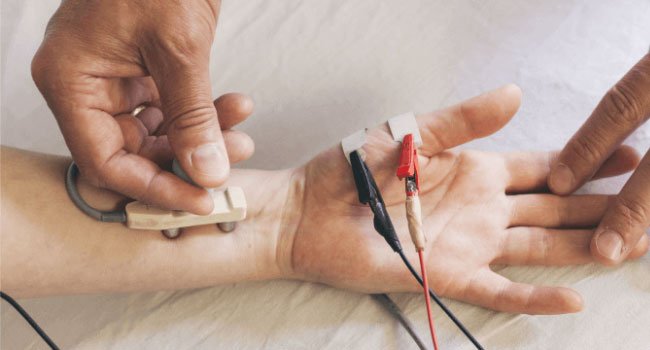What is a nerve conduction velocity test?
A nerve conduction velocity (NCV) test determines how quickly an electrical impulse travels through your nerve. NCV is capable of detecting nerve injury. This examination is also known as a nerve conduction study (NCS).
During the test, your nerve is stimulated, usually using electrode patches applied to your skin. Two electrodes are implanted on the skin, either over a nerve or a muscle. One electrode sends a very mild electrical stimulus to your nerve. It is recorded by the other electrode. Another electrode records the resultant electrical activity. This is done for each nerve that is being tested. The speed is then determined by measuring the distance between electrodes as well as the time it takes electrical impulses to travel between electrodes.
Electromyography is a similar test that may be performed (EMG). This device detects electrical activity in your muscles. It is typically performed at the same time as an NCV. Both tests aid in determining the existence, location, and severity of illnesses that affect the nerves and muscles.
How should I prepare for an NCV test?
- In most cases, you will not be required to fast or undergo sedation before the procedure.
- Before and throughout the procedure, the patient’s body temperature must be kept normal. Nerve conduction is slowed when the body temperature is low. Inform the examiner if you are feeling chilly.
- Inform your medical professional about any medications (both prescription and over-the-counter) and herbal supplements you use. Specific medications may need to be modified for certain situations.
- Wear clothing that allows access to the region to be examined
- For a few days before your treatment, avoid applying lotions or oils on your skin.
- Your doctor may recommend further preparations based on your health condition.
What happens during the NCV test?
An NCV procedure may be performed as an outpatient procedure or as part of a hospital stay. Procedures may differ based on your condition.
In general, an NCV method involves the following steps:
Any clothes, jewellery, hairpins, eyeglasses, hearing aids, or other metal items that may interfere with the process will be requested to be removed.
If you are required to remove your clothes, you will be provided with a gown to wear. For the exam, you will be instructed to sit or lie down.
A neurophysiologist will locate the nerve(s) to be studied. The number of nerves examined is determined by your condition. Your nerve will be stimulated by a moderate and short electrical shock delivered via the stimulating electrode. The nerve stimulation and reaction will be shown on a monitor.
What happens after an NCV?
The paste used to adhere the electrodes to your skin will be removed. Electromyography (EMG) is often performed along with NCV testing. Unless your healthcare professional tells you otherwise, you may resume your normal activities after the test. Your doctor may advise you to avoid vigorous activity for the remainder of the day. Depending on the situation, your doctor may provide you additional instructions following the procedure.

